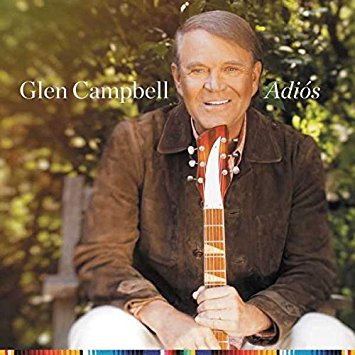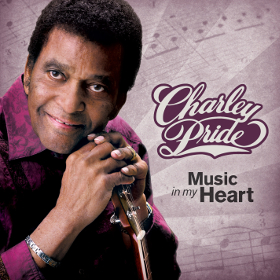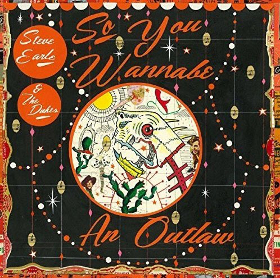Now for something I’ve wanted to do all year but couldn’t bring myself to: spotlighting Glen campbell’s final album. I had listened to a couple songs before now, but to try and listen to the whole thing was just too sad for a Glen fan like me. But I wanted to honor him with this and made it my goal to do before the end of 2017. I thought I’d enlist another Glen fan to help honor him as well, so I got Zack of The Musical Divide to join me in sharing his thoughts about Campbell’s last album. Neither of us wanted this to be a review, just a way to honor our friend.
Megan: So what we have here is mostly–actually I thought until I heard this that it was all–cover songs, but they’re songs that one, meant something to Glen, as they were supposedly songs he gravitated toward when he was just sitting around with his family picking his guitar, and two, a lot of them also have undertones running through them that sort of explain what’s going on for him at the time.
Zack: “I think overall that yes, Adios is mostly a covers album full of the few songs Glen was still able to play. However, the way that the majority of the tracks speak to deeper levels given his condition is chilling. I think overall it’s amazing how great and passionate he still sounded vocally, and even the instrumentation is often on point. I enjoyed the soft touches of piano on “Just Like Always” and “Postcard From Paris”, and the crisp fiddle on “Arkansas Farmboy” was a treat for the ears.
Zack: I love the rollicking banjo on the opener, “Everybody’s ‘talkin’.” I think one thing you notice with this album is that they aren’t just cover songs. They’re sort of relatable to what was his situation at the time. For example, he says everybody’s talking at him, and he can’t hear a word they’re saying. With Alzheimer’s, him “not hearing” could be him not comprehending or remembering what was being said. A joyous opener on an instrumental standpoint, but a somber way to open it all.
Megan: I noticed all that too, and as we’ve mentioned, it will sort of continue to be a theme throughout this record, lingering in the background to add a touch of sadness to the whole thing. I also am amazed by how surprisingly good his voice is.
Zack: I agree regarding him being really solid vocally all throughout this album. With the next track, “Just Like Always”, he’s recalling a special night he had with his lover, and with the soft piano bolstering it, it’s meant to be seen more as somber I think for this version. After all, we again get a line such as “Maybe someday I will forget”, and that can’t be a coincidence. Of course, there’s enough ambiguity in the writing to imply that even if he does forget that night and even if his lover in question moves on, their love will still last forever. There’s a lot of subtext here. Really solid, touching, and honestly hard to listen to so far. It’s beautiful.
Megan: Speaking of hard to listen to, enter “Funny How Time Slips Away.” It also obviously reflects what’s going on with Glen, and in that light, it’s got more meaning than the original intent of the song. He and Willie Nelson should have done more stuff together, that pair really works.
Zack: Considering this is similar thematically to Just Like Always, I see this more as a counter moment of levity considering how heavy the album starts. Considering he’s doing it with Willie, it feels just like two old buddies dusting off one of the few songs people will know is a cover right from the get go. I mean, there’s at least some humor as the narrator calls out his ex for saying she’ll love her new beau forever when that’s the same thing she told him originally. Like I said, I see it merely as a counter to the darkness so far, and it’s needed.
Megan: I’ve never heard “Arkansas Farm Boy” either. This is a more lighthearted song too, and one of the few without as much of the sad undertones and double meanings. I need to find the original of this, this is a really great song. Also love the fiddle.
Zack: Oh, this is actually an original tune. I like how he recalls his childhood here. Sure, it was tough, but at the same time he remembers everything very fondly, especially since it’s when he learned to play music. At the same time, we have allusions to his aging self again as he states he’d give anything to go back again. It rings a hell of a lot more louder than say, someone on the radio wanting to be twenty again just so they can get drunk every weekend…
Megan: I also enjoy “Am I All Alone”. It goes in with the theme of songs reflecting his state of mind. I Actually would like to hear more Vince Gill if I’m honest.
Zack: Ha, I’d like to hear more of Vince Gill as well, but at least it isn’t another “Sober Saturday Night” moment.
Megan: They talked about having to give this to Glen line by line in a lot of places, and it speaks to the fact that he is a ridiculous vocalist that it’s all so connected emotionally, like in “It Won’t Bring Her Back” and later in “She Thinks I Still Care.” “It Won’t Bring Her Back” is the highlight of the album for me so far.
Zack: Really? I actually didn’t know that. Everything blends together so well that I would have never guessed. Unfortunately it makes sense, but the fact that you can hardly even tell is stunning. Anyway, moving on to “It Won’t Bring Her Back”, the advice from a friend to another to let go of a past lover on “It Won’t Bring Her Back” is reminiscent of “I’m Not Gonna Miss You” in a way. Unfortunately we do lose people whether it be through breakups, them moving away, and deaths among scenarios. There is a time for grieving, but what’s most important is that we move on knowing we’ll always have those memories to go back to in our time of need, at least for now.
Zack: “Don’t Think Twice, It’s All Right” is another moment of levity akin to “Funny How Time Slips Away” only much more upbeat. It’s amazing how much charisma Glen still had at this point.
Megan: Everybody and their mother has covered that song, and yet it’s still great. I second your thoughts on that charisma thing. Like I said, it’s amazing how invested he is emotionally in all these songs if it had to be done line by line a lot. His family and his producer said that they picked songs he always picked up his guitar and sang because he would know them easier. They said he knew some of it, but a lot of days, they had to give it to him line by line so he could remember. Given that, it’s a testament to his talent that he can interpret all these songs so well.
Zack: That honestly just made listening to this a lot tougher. Especially now that we’ve gotten to my personal favorite here, “Postcard From Paris”. I love that his family provides harmony on this one. It’s easily my favorite track here. The imagery that centers around him traveling around the world hoping to find himself is an interesting spin, and the fact that in the end, he can’t do it without his friend (assuming it’s his lover) is touching. In a way the traveling could even be seen as a metaphor for him traveling somewhere else in his mind, and the fact that his family sings “I wish you were here”…damn it, this piano ballad nearly made me cry.
Megan: I agree, it’s a truly lovely song with another story of missing someone with undertones of what he is going through as it talks about things like the shadows falling all around. There is some really great piano supporting this one as well. Although, it’s good we have the next song, “A Thing Called Love” to lighten the mood. The song will just put a smile on your face after that incredibly heartbreaking moment. Very well-placed and correct, asserting that love can bring down even the strongest and most jaded of us all.
Zack: I agree, it’s another moment of levity, but I still think there’s something more to this. After all, it essentially echoes what Just Like Always did which is show how love can prevail over disease, death, or really anything. It’s the one thing that will remain after we’re gone, mentally or physically.
Megan: Really excellent point there.
Zack: Thank you! Or rather, thank Glen.
Megan: And now we’re at the closer, “Adios”. “I miss the blood red sunset, but I’ll miss you the most.” Yeah, that sums up this whole album. It’s a depressing goodbye song, but also it’s reflective and not as obviously about death, so it leaves you sad but not devastated. There are a lot of depressing moments here, but this album is kind of comforting as well.
Zack: Yes, “Adios” is obviously a somber closer, but I enjoy the ambiguity in the writing. Jimmy Webb has a way of saying a lot with very few words, and this is an example. It’s a touching sort of “goodbye” song that sure, is meant to signal a breakup more than anything, but that doesn’t mean the sentiment on this particular album doesn’t ring louder than that. Overall, this is the type of album that’s hard to talk about in so many ways. The many covers here take on new meanings in the context of this album, and knowing what you said about him having to do most of this line by line…it’s just heartbreaking really. Still, the finished product which is now the official last Glen Campbell album is a treasure.
Megan: Yeah, this was hard to listen to and hard to talk about, but in a way, it’s also a comforting listen and a bit of a snapshot into what Glen was going through when he recorded this. Enjoyed sharing his final album with you, and thank you, Glen, for a lifetime and legacy of music.


